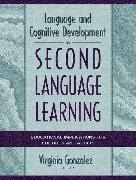Share
Fr. 42.60
Virginia Gonzalez
Language and Cognitive Development in Second Language Learning:Educational Implications for Children and Adults
English · Paperback / Softback
Shipping usually within 3 to 5 weeks
Description
List of contents
Chapters conclude with “References.” I.PHILOSOPHICAL AND THEORETICAL MODELS.
1.Folkloric and Historical Views of Giftedness in Language-Minority Children, Virginia Gonzalez, Ph. D., and Ellen Riojas-Clark.
A Brief Overview of Folkloric and Historic Giftedness.
A Folkloric View of Giftedness in Language-Minority Children.
Historical View of Giftedness.
Educational Implications.
2.An Integrative Analysis of the Cognitive Development of Bilingual and Bicultural Children and Adults, Virginia Gonzalez, and Diane L. Schallert.
Issues in the Study of Cognitive and Language Development in Bilinguals.
The Proposed Triple-Interactional Model of Cognitive, Linguistic, and Cultural Variables.
Conclusions.
II.COGNITIVE AND LANGUAGE DEVELOPMENT IN BILINGUAL CHILDREN AND ADULTS.
3.Construction of a Phonological Development Test for Monolingual Spanish Preschoolers Learning English as a Second Language, Virginia Gonzalez.
Review of the Literature.
Hypotheses.
Method.
Results and Discussion.
Other Administrations of the Phonological Development Test Constructed.
Diagnostic Categories.
Conclusions.
4.Models for the Relationship among Language, Relative Degree of Bilingualism, Phonological Strategies, and Reading Readiness in Bilingual Spanish/English Children, Virginia Gonzalez.
The Assessment of Cognitive and Language Development in Bilingual Children.
Method.
Results and Discussion.
Conclusions.
5.Why is It “Una Persona” and Not “Un Persona?” Influence of Linguistic and Cultural Variables on Conceptual Learning in Second Language Situations, Virginia Gonzalez, Diane L. Schallert, Sonia de Rivera, Martha Flores, and Lorri Perrodin.
Concept Construction and Strategy Use in Second Language Learning.
Methodological Problems.
The Proposed Multidimensional Model.
Method.
Results and Discussion.
Conclusions.
Appendix A: Semantic Categories for Gender.
6.Conceptualizations of “Ser” and “Estar” by College Students Learning Spanish as a Second Language and Adult Spanish Native Speakers, Virginia Gonzalez, and Sonia de Rivera.
Literature Review.
Method.
Results and Discussion.
Conclusions.
Appendix A: Sentence Pairs Using Ser and Estar.
III.ALTERNATIVE ASSESSMENT OF LANGUAGE-MINORITY CHILDREN.
7.Alternative Assessment Models of Language-Minority Children: Is There a Match with Teachers' Attitudes and Instruction? Maria Felix-Holt, and Virginia Gonzalez.
Study Overview.
Statement of the Problem.
Theoretical Framework.
Literature Review.
Method.
Results and Discussion.
Conclusions.
Appendix A: Teachers' Interview Questions.
Appendix B: Categories for Coding Teachers' Responses to Interview Questions.
Appendix C: Summaries of Findings for Different Subjects.
8.Standardized and Alternative Assessments: Diagnosis Accuracy in Minority Children Referred for Special Education Assessment, M. Dynah Oviedo and Virginia Gonzalez.
Study Overview.
Statement of the Problem.
Assessment Model.
Literature Review.
Method.
Case Studies for Research Question 1.
Case Studies for Research Question 2.
Conclusions.
9.Influence of Evaluators' Beliefs and Personal Backgrounds on Their Diagnostic and Placement Decisions, Virginia Gonzalez, Patricia Bauerle, Wendy Black, and Maria Felix-Holt.
Literature Review.
Research Questions.
Method.
Results.
Discussion.
Conclusions.
Appendix A: Interview Questions.
Appendix B: Categories for Analyzing the Evaluators' Responses to the Interview.
IV.CONCLUSIONS.
10.The Impact of Paradigmatic Shifts on Second Language Research: Patterns and Conclusions, Virginia Gonzalez.
Summary
This edited volume seeks to increase the availability of research-derived knowledge and educational applications in the field of second-language learning. Virginia Gonzalez offers a rare and highly creative approach to second language acquisition research by applying contemporary cognitive psychology theory as a framework for investigating bilingual issues. The text offers a coherent and unified philosophy and context, presenting original research studies that provide a multidimensional socio-educational view to second-language learning and instruction in children and adults. Gonzalez and her colleagues assume the identity of the “Ethnic-Researcher,” thereby emphasizing the need to include cultural and linguistic factors when studying, assessing, and instructing second-language learners.
The text presents a blend of methodology, both qualitative and statistical, and offers new instruments and models for studying traditional and contemporary problems of second language acquisition. Unlike other texts on the subject, Language and Cognitive Development in Second Language Learning goes beyond just discussing these issues at the polemical/political level and provides a cohesive view to the scientific study of second language learning from a developmental perspective that includes both children and adults.
Product details
| Authors | Virginia Gonzalez |
| Publisher | Pearson Academic |
| Languages | English |
| Product format | Paperback / Softback |
| Released | 01.01.1998 |
| EAN | 9780205261703 |
| ISBN | 978-0-205-26170-3 |
| No. of pages | 310 |
| Weight | 490 g |
| Series |
Allyn & Bacon Allyn & Bacon |
Customer reviews
No reviews have been written for this item yet. Write the first review and be helpful to other users when they decide on a purchase.
Write a review
Thumbs up or thumbs down? Write your own review.

